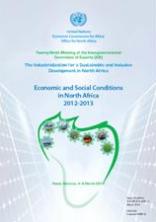Economic and Social Conditions in North Africa, 2012-2013

In North Africa, the year 2013 witnessed the impacts of the slowdown of global growth and by the continuation of the transitions relating to the sociopolitical crises in many countries of the subregion.
The slowdown of the global economy took place in a context of continued tight fiscal disciplines in many developed countries, a high rate of unemployment and the contraction of the global external demand which resulted in the slowdown of growth in many emerging countries. Like many other developing areas, North Africa suffered from this poor climate, while facing more acute challenges.
These exogenous constraints have reduced the margin of action to deal with these challenges and highlighted the need to alleviate the vulnerability of the sub-region towards exogenous shocks, through a proactive approach of diversification either of partners and of the productive system.
Beyond the external sphere, in most of the countries of North Africa arose the issue of the implementation of countercyclical policies, which stimulate the domestic demand to boost growth and trigger the acceleration of the creation of more skilled and better quality jobs in order to meet the challenges of unemployment, mainly of graduates which is still high.
Such proactive approaches may put additional constraints on the balance of public finances and on their sustainability in the long run. Thus, the discussion also tackled the issue of their support by reforms of the subsidy and money transfer systems to make these latter more efficient and become mechanisms of a real sustainable and inclusive growth.
This report analyses and assesses the economic and social developments over the last year and the prospects of the sub-region and of the countries for the upcoming year. In particular, it provides basic data and information on recent development policies in order to stimulate a wider debate between Member States, intergovernmental organizations and other development actors. It also suggests recommendations to be discussed and completed by the participant to the XXIXth meeting of the Intergovernmental Committee of Experts (ICE), in order to identify the most appropriate orientations and measures for the development challenges facing the countries and the sub-region as a whole.
In the elaboration of this report, priority was given to data provided by the member states through the questionnaire established by the Bureau, and communicated to Member States in October 2013, then supplemented by the data compiled by the ECA African Centre for Statistics, other UN system's agencies, the International Monetary Fund, and the World Bank. Diversity of resources and the unavailability of data on some variables, from a country to another, call for the review of the current system and for the establishment of a series of mechanisms for the systematic and regular collection of data. This is one of the reasons ECA is considering the regular establishment of country profiles, with the main objective of providing a new tool for the elaboration and dissemination of analyses and recommendations on the economic transformation, regional integration strengthening, planning of the development and economic governance, and for the support of decision-makers in their efforts to mitigate potential risks. The process of compiling these country profiles will involve continuous collection and harmonization of data and information on the country, aggregation of indicators on the regional economic communities (RECs) and the sub-regions, and the analysis of trends in order to produce more appropriate forecasts. The main outcome of the process of the country profiles will be building capacities of Member States to produce and disseminate quality and accurate statistics, as well as the analysis of challenges, issues and suggested responses leading to a planning based on reliable data and the elaboration of policies based on national and sub-regional priorities in terms of development.
The report is divided onto three chapters. The first chapter deals with the international and regional environment. It presents the main evolutions in 2013 in the major economies and regions worldwide. The second chapter deals with the evolution of the main macroeconomic aggregates in North Africa. It analyzes the evolution and prospects of growth, inflation, exchange rate, foreign trade, investment and monetary variables. The third and last chapter is devoted to social and human development and to the analysis of the evolution of the situation of employment and the measures aiming at meeting the different social challenges facing the countries of the sub-region. The report concludes with a summary of the main conclusions and recommendations the Bureau will submit to the appreciation and validation by the ICE. Recommendations of the ICE will be submitted for final validation by the ECA Conference of African Ministers of finance, planning and economic development.